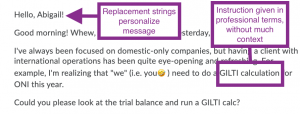If you work in higher education, you’ve heard about career readiness. But it’s not that easy to drop students into real world situations where they’ll put knowledge to work, while also supporting their learning.
How Can A Course Immerse Students In the Real World?
Also, how can a course evoke a job without recreating the stresses, frustrations, and confusion that exist in so many early career roles? These questions were top of mind when I sat down with the Master of Taxation program’s Dave McArthur to design TX8120: Taxation of Corporations and Shareholders. Dave’s an in-house accountant at Coca-Cola, so he knows all too well how tax professionals respond quickly to the dynamic tax landscape. He learns on the fly every time tax policy changes, and he wanted to create a course where students explore their own flexibility and responsiveness. Who says accounting isn’t a suspenseful profession?
Our Solution: The Corporate Compliance Project
The key to creating meaningful real world projects can be simple: reflect on the profession your students will be joining. What do you wish you knew? What are situations that challenge early career professionals the most? In addition to his work history, we channeled Dave’s deep experience as a frustrated Atlanta sports fan to create a fictional client for his students: a parent company called Georgia Sports Underwhelm. Throughout the course, students calculated taxes, compared sale and reorganization scenarios, and filed consolidated returns for their client.

Logo Created By CETLOE Multimedia
To introduce each assignment, the instructor wrote a message to students in the voice of a busy (and sometimes disgruntled) working accountant. We used simple iCollege tools like Announcements and replacement strings to create the personalized messages, and students loved the experience of putting their knowledge to work on behalf of a colleague who called them by name.

Task Message from Corporate Compliance Project
We also built more detailed assignment pages instructing students in how they might complete the varied tasks. In these two different methods of communication, we hoped to both familiarize students with the terse requests they’ll encounter, but also guide them toward course resources, skills, and knowledge to use when faced with such a task. Who hasn’t worked with a preoccupied colleague that doesn’t explain things well?

Assignment instructions for Corporate Compliance Project
How Does the Corporate Compliance Project Support Learning?
Developing this project made the course more focused. Each time Dave created a new thing for the project, he looked to the module learning objectives we’d already developed. Moving forward, he can also use this project to update and realign course goals. Since I worked with Dave, there’s a new president, with new tax policy on the horizon. But this doesn’t mean he has to scrap his work. Since we created scaffolded assignments that thread through different modules, he can add steps where students make projections based on possible new policy, while still asking them to analyze tax consequences based on older laws. At CETLOE, we often talk about how teaching is iterative. Using changes in the real world as inspiration for iteration makes course material continually engaging. This project is animated by the same political forces that keep the profession moving. And now that Atlanta has won the World Series, surely Georgia Sports Underwhelm needs another tax-free reorganization.
 Abby Greenbaum is a learning experience designer at CETLOE. She’s not a Georgia sports fan by birth, but her three-year-old daughter has decided to be one.
Abby Greenbaum is a learning experience designer at CETLOE. She’s not a Georgia sports fan by birth, but her three-year-old daughter has decided to be one.


You must be logged in to post a comment.